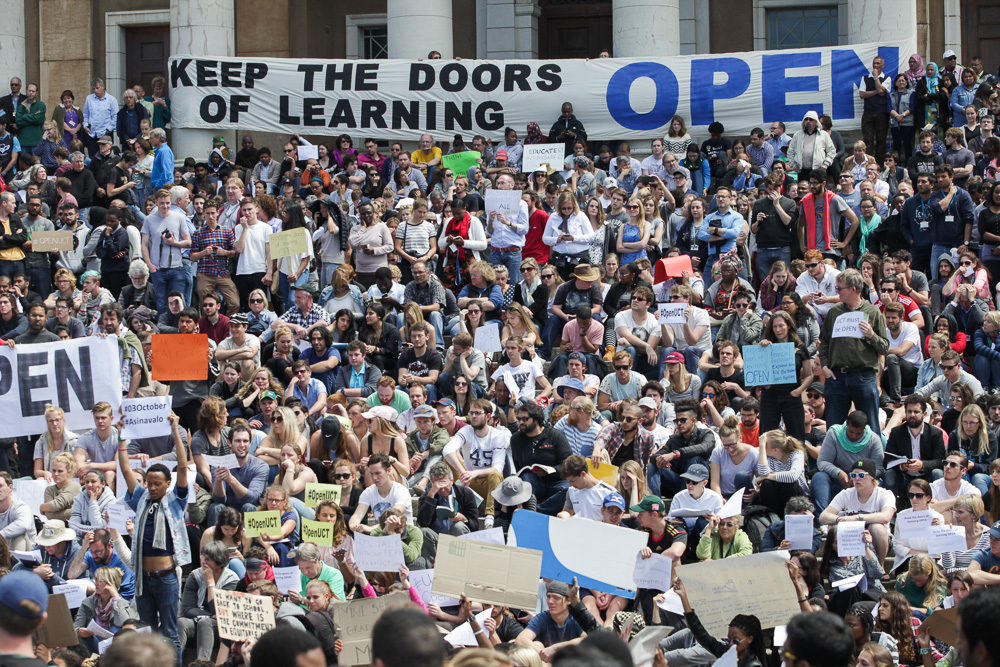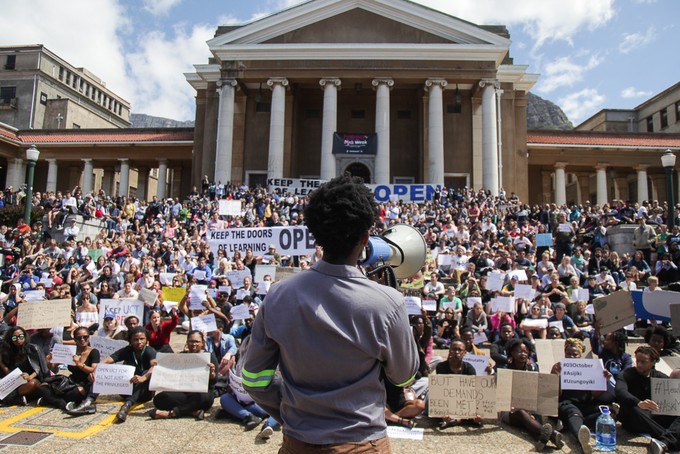Thousands of students and staff hold silent protest for UCT to stay open
About 100 #FeesMustFall students continue to call for shutdown
Thousands of students and staff heeded a call, started on WhatsApp, to sit down for an hour and read in silence on the steps of the University of Cape Town (UCT) upper campus. Behind them was a banner stating “Keep the doors of learning open”. They have one demand: that UCT should be open on Monday 3 October.
A few minutes after the silent protest started, a group of about 100 #FeesMustFall protesters. who earlier had been protesting outside the university administration offices, marched up the steps and stood in front of the bulk of the silent protesters. They sang and made speeches through a megaphone, insisting that the university cannot open next week.
The atmosphere remained calm throughout. After about a half-hour, the #FeesMustFall protesters left.
Saif Khan is a third-year science student hoping to graduate this year, and one of the organisers of the silent protest. He is also the chairperson of the Science Students Council. He told GroundUp: “The aim is not to go against the [#FeesMustFall] protests. We want campus to start on 3 October. We want management to resolve this.” Before the silent protest began, he said that he hoped the #FeesMustFall protesters would join the silent protest and for all students to communicate with each other. “We want students who haven’t had a voice to come and express themselves,” he said.
Nicola Illing, who teaches biochemistry and genetics, said that last week protesters disrupted a prac she was running for second-year students. She explained that setting up a genetics prac is expensive. The protesters set off fire alarms in the building. She and her students were not sure why the alarms went off. So, taking no chances, they evacuated the building. At the entrance, protesting students told people to leave. Illing and her students however found a back entrance into the building and resumed their prac. The next day a lecture she was giving was disrupted three times by protesters, who danced on the desks. But she and her students did not move and eventually the lecture was able to continue.

Petitions to stay open
After most of UCT was closed this week because of the #FeesMustFall disruptions, there is a growing call by UCT students and staff for the institution to open on Monday and for the academic year to be completed. Earlier this week the science faculty held a poll. About 80% of those who participated wanted the university to remain open. Fewer than 10% of respondents voted against reopening (More voted for “unsure”). The poll response rate was 35%.
Over 100 students in the law faculty have signed a petition calling for the university to stay open. The petition acknowledges “the importance of many of the issues raised by this year’s protests” but warns that cancelling the remainder of the academic year “would have dire effects on many (if not all) UCT students”.
The petition states:
“Those of us who cannot afford to remain in Cape Town beyond 2016 will not be able to finish their studies. Students’ employment or postgraduate opportunities in 2017 will be jeopardised. The process of having to delay exams, or re-learn material, will cause immeasurable stress and anxiety for students. UCT will suffer significant financial losses, from which it may never fully recover, limiting current and future students’ academic opportunities. Ultimately, many of the issues highlighted by the protests, such as accessible, decolonised education, or better working conditions for UCT workers, will be severely undermined by an indefinite suspension of the academic project.
For these reasons, we object in the strongest possible terms to postponing indefinitely the academic year. We demand that lectures and other academic activity resume by no later than 3 October 2016. We will refuse to accept the cancellation of the academic year.”
Support independent journalism
Donate using Payfast

Don't miss out on the latest news
We respect your privacy, and promise we won't spam you.
Next: Standoff between management and student protesters at DUT
Previous: Khayelitsha residents urged to report police brutality
Letters
Dear Editor
As I see it the issues surrounding the ongoing protests at UCT can be boiled down to three primary elements, and I’ll respond to each one.
1. UCT needs to stay open - students & academics need to return to class: The voices of various groups have been heard loud and clear. Now (or October 3rd) is time for protesters to allow free, unhindered access to the campus and to all classes, labs and offices. Creating a threatening atmosphere and the potential for violence that caused UCT to be closed is simply “theft”. The protesters are effectively stealing from students (or their families) that paid for a full year of university education. The protesters are also ‘stealing’ from the taxpayers, philanthropists, donors, etc., who support UCT’s academic and research objectives.
2. Free Tuition/Fees: Very few countries around the world offer free university education to all. The citizens of those countries (primarily in Western Europe) pay significantly higher taxes than the taxpayers in South Africa. Getting SA citizens to accept and, more importantly, to pay higher taxes is unrealistic and probably impossible. It is not in our nature to fully appreciate or value anything that is “free”. Consumer research has shown that people are more likely to use products that they pay for; such products carry more intrinsic value to the consumer. At the same time, the university administration needs to ensure that academically qualified students are not denied admission to, or attendance at, UCT. Distribution of financial aid on an “as needed” basis will surely be the best remedy to the financial challenge of attending university.
3. Transformation: There are surely ways to transform/change the curriculum to recognize the changes in South African society, and these changes are more relevant to the humanities. Nevertheless, students in the sciences and professional fields (accounting, engineering, medicine, etc.) should be exposed to issues relevant to South African society as a whole. They should be taught that they will need to solve problems faced by developed countries
© 2016 GroundUp. 
This article is licensed under a Creative Commons Attribution-NoDerivatives 4.0 International License.
You may republish this article, so long as you credit the authors and GroundUp, and do not change the text. Please include a link back to the original article.

